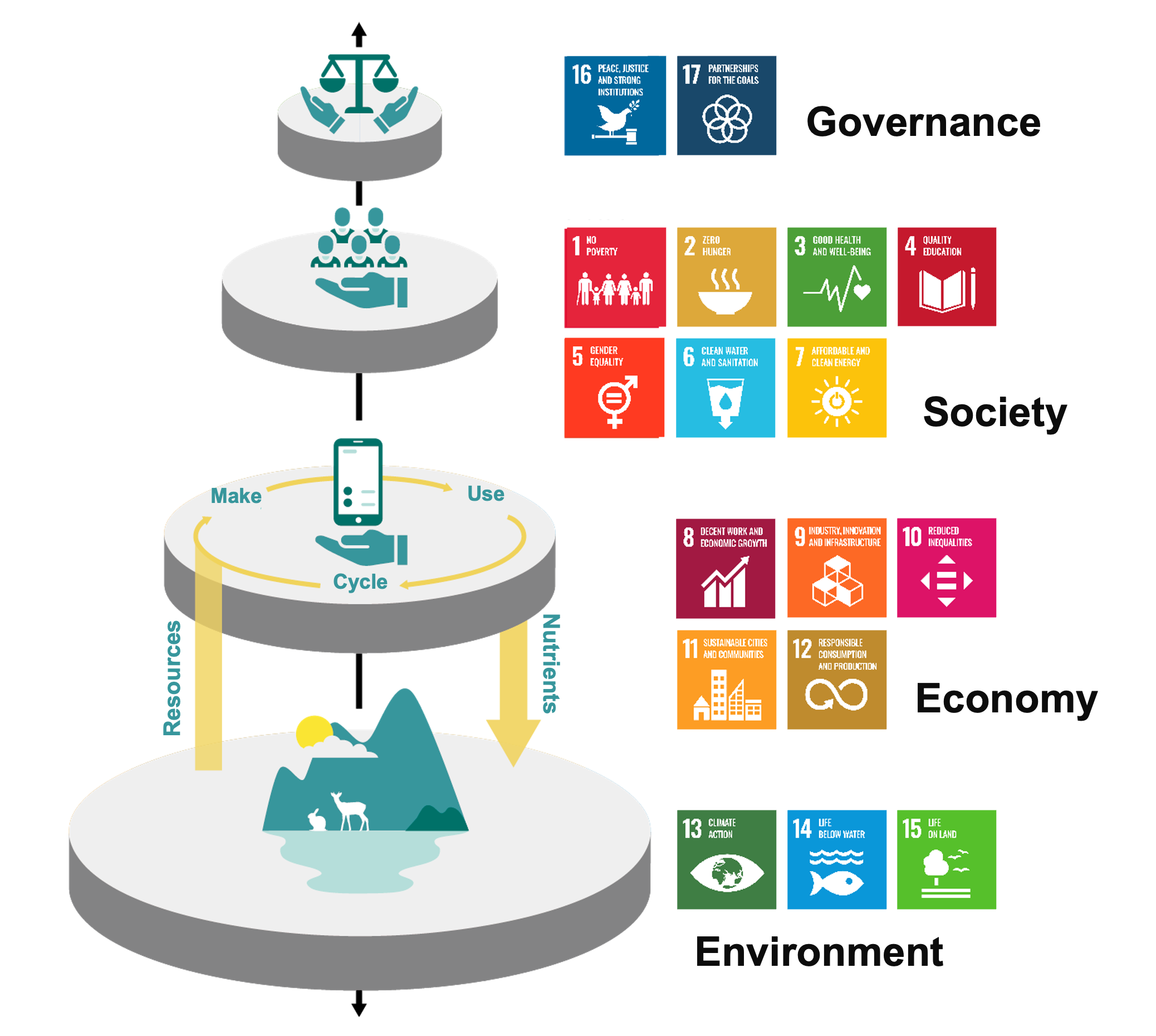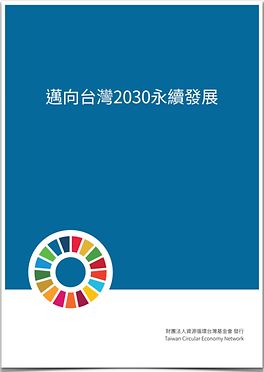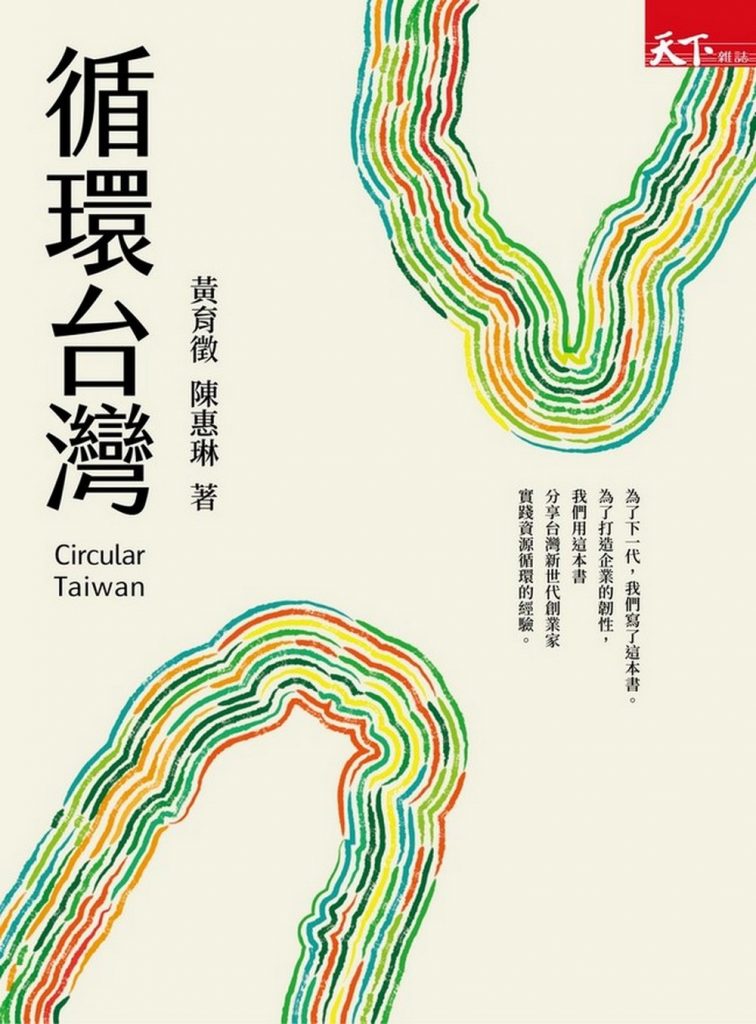The United Nations Environment Programme (UNEP) has emphasized that sustainable resources and a healthy ecological environment are fundamental conditions supporting economic activities and social structures. The key priority in achieving sustainable development is to decouple economic production and consumption activities from resource depletion and environmental impact. Developed countries such as Taiwan must implement meticulous, integrated planning for resource-related issues to achieve absolute decoupling.
In 2015, the United Nations introduced the 2030 Agenda for Sustainable Development, which consists of 17 interconnected Sustainable Development Goals (SDGs).
Sustainable development encompasses three main pillars—environment, economy, and society, along with governance, forming four core dimensions. Their relationship is as follows: through economic activities such as production and consumption, humans convert resources provided by the environment into goods and services that fulfill societal needs, enhancing overall quality of life and well-being. Meanwhile, governance, from local to national and global levels, profoundly influences how these three dimensions—environment, economy, and society—operate.
The root cause of unsustainability lies in the linear economic model, where continuous extraction of raw materials fuels economic activities while simultaneously generating waste and pollution. This disrupts natural regulatory mechanisms and depletes essential ecosystem functions, ultimately leaving future generations to face resource scarcity, environmental degradation, and ecological imbalance.
Although environmental protection measures help mitigate these impacts, they cannot fully resolve the problem. The core issue stems from the economic model itself, which must be restructured to achieve true sustainability.

The Interconnected System of the Four Pillars of Sustainable Development
- Governance: Addressing grand challenges such as climate change requires global solidarity and coordination under the SDGs framework to unify efforts and drive systemic change. Relevant goals include SDG 16 and 17.
- Society: Covers fundamental human needs, aspirations for self-fulfillment, quality of life, and equal rights to voice opinions and make choices. Relevant goals include SDG 1, 2, 3, 4, 5, 6, and 7.
- Economy: Serves as the link between environment and society, as economic activities transform environmental resources into products and services that meet societal needs. Relevant goals include SDG 8, 9, 10, 11, and 12.
- Environment: Encompasses natural resources such as water, land, and minerals; biodiversity, which sustains ecological balance and resilience; and ecosystem functions that provide essential services such as nutrient cycling and climate regulation. Relevant goals include SDG 13, 14, and 15.
The sustainability of our environment for future generations hinges on whether we prioritize economic objectives that fundamentally redesign how resources are utilized. It is imperative to satisfy human needs without excessive resource extraction while simultaneously restoring and regenerating natural systems. The key to this transformation lies in adopting a circular economy—an economic model in which resources are continuously cycled and regenerated.
The UN’s SDGs are designed as a flexible framework adaptable to different national contexts and development levels. Countries are encouraged to integrate SDGs into domestic policy planning and action agendas based on their specific priorities.
In developed economies where basic needs are largely met, the primary sustainability challenges revolve around economic growth, reducing inequality, promoting sustainable consumption and production, and advancing climate action. For instance, OECD member countries prioritize these concerns in their sustainability strategies.
To advance Taiwan’s sustainable development agenda, government entities, businesses, and civil society must first identify the fundamental challenges preventing long-term sustainability. Instead of addressing SDGs in isolation or tackling only symptoms, a systemic approach is required to uncover the root causes of these issues and ensure alignment across initiatives. For example, education levels influence health and employment opportunities, while sustainable agriculture depends on integrated water and energy management.
Given Taiwan’s industrial development, the impact of economic activities on the environment should be a focal point. Civil society plays a crucial role in driving sustainability efforts, particularly in the business sector. Companies should prioritize reviewing their core production and consumption activities, implementing strategies that use fewer resources while creating diversified value.
The Circular Taiwan Network synthesized UN SDGs data and the Taiwan Sustainable Development Goals to publish the "Towards Taiwan 2030 Sustainable Development" report in 2018. This report serves as a strategic guide to facilitate a holistic view of sustainable development, offering baseline data on Taiwan’s SDG progress and helping public and private sectors identify critical sustainability challenges. The goal is to drive focused, swift, and effective actions.
A circular economy is an industrial system that emphasizes resource regeneration and recovery. Unlike the traditional linear economy—based on an extract-produce-consume-dispose model—a circular economy follows a make-use-recycle approach. It relies on redesigning processes, business models, and resource efficiency improvements to prevent waste generation at the source while maximizing value creation with minimal resource consumption.
By adopting circular economy principles, SDGs related to economic development can be directly advanced, human development needs can be met, and environmental objectives can be strengthened through reduced resource demand, lower carbon emissions, and minimized waste production.
Taiwan Sustainable Development Goals and Taiwan 2022 Voluntary National Review on Sustainable Development, published by Taiwan’s National Council for Sustainable Development under the Executive Yuan.
"Business Reporting on the SDGs – An Analysis of the Goals and Targets" (2017), jointly published by the United Nations Global Compact (UNGC), Global Reporting Initiative (GRI), and PwC, providing guidance on integrating SDGs into corporate reporting and stakeholder engagement to measure corporate sustainability performance.

